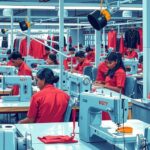Politics
APPAREL RESOURCES, ASHULIA, ASIA, BANGLADESH, BANGLADESH GARMENT MANUFACTURERS AND EXPORTERS ASSOCIATION, CHINA, CHITTAGONG, CLIMATE, DONALD TRUMP, ECONOMIC IMPACT, GA, GAZIPUR, INDIA, INDUSTRIAL POLICE, MEXICO, NARAYANGANJ, NARSINGDI, NATURAL DISASTERS, NORTH AMERICA, PUBLIC HEALTH, SAVAR, SAVAR - ASHULIA, TRADE, TRUMP, US
Nia Simpson
Impact of Trump Tariffs on Bangladesh’s Garment Industry: A Looming Crisis
Bangladesh’s garment industry faces dire challenges due to a 37% tariff imposed by the Trump administration. The closure of numerous factories has resulted in the loss of significant employment, particularly among women. The situation is compounded by labor unrest, political instability, and rising competition in the industry, raising concerns for women’s empowerment and economic stability.
The ready-made garments sector in Bangladesh, the world’s second largest producer after China, is facing a severe crisis due to newly imposed tariffs by the Trump administration, which increased from 16% to a staggering 37%. This tariff change has had a detrimental impact on the industry, already grappling with job losses and political instability. Currently, only 350 out of 611 registered garment factories in Chittagong are operational, as numerous factories have shut down over the past year, exacerbating the economic troubles in the region.
A report by Apparel Resources reveals that at least 76 factories have closed in Chittagong in the previous year, resulting in over 50,000 workers, predominantly women, losing their jobs. Additional estimates suggest that the number of closures is significantly higher, with Prothom Alo reporting that 95 garment factories ceased operations between August 2024 and March 2025. This situation poses a critical risk to a sector that constitutes 11% of Bangladesh’s GDP and employs over four million workers.
The impact of the 37% tariff is immense, as Bangladesh’s cotton garments represent a significant portion of its exports. Business leaders have expressed their concerns about this sudden tariff increase, noting that it could lead to the loss of buyers to more cost-effective markets. The US accounts for 20% of Bangladesh’s ready-made garment exports, valued at approximately $8.4 billion in the previous year. Factory owners are apprehensive about shifting their market focus, recognizing the inherent challenges in finding new buyers.
Bangladesh houses nearly 4,600 garment factories, supplying to major global brands including Carrefour, Uniqlo, and H&M. Anwar Hossain from the Bangladesh Garment Manufacturers and Exporters Association commented on the industry’s inability to brace for the tariffs, saying, “We were not ready for this blow; it was so sudden.” Fortunately for Bangladesh, its competitors, China and Vietnam, face even higher tariff rates, offering some solace.
In addition to tariff issues, the industry has also faced widespread labor unrest over the past few years due to demands for higher wages and better conditions. The Business & Human Rights Resource Centre reported that 183 factories have closed due to ongoing protests. The interim government has taken action, imposing travel bans on factory owners who failed to meet wage obligations, causing further distress among workers.
Moreover, the political landscape in Bangladesh has become increasingly volatile following the recent ousting of the Awami League government, leading to factory vandalism and heightened tensions. The ongoing power shortages and port congestion have further disrupted deliveries to international buyers, prompting concerns about the continuing viability of the garment sector.
The urgent need for modernization is evident as Bangladesh contends with rising competition. A recent survey indicated that 80% of top factories intend to invest in semi-automated machines, likely resulting in a 22% reduction in workforce. This situation places additional pressure on women, who make up the majority of the industry, as they encounter extreme work conditions and stringent productivity monitoring, with reports of health issues stemming from excessive work demands.
The crisis threatens not only economic stability but also women’s empowerment, as financial independence has provided women in Bangladesh a greater voice in society. With the potential increase in poverty and loss of rights due to job losses, the rise of religious conservatism poses a grave threat to the progress achieved by women in this sector. There are fears of increased trafficking and illegal migration as the existing political and economic crises worsen.
The ready-made garments sector in Bangladesh is grappling with an unprecedented crisis fueled by recent tariffs imposed by the Trump administration, alongside internal political instability and labor unrest. The implications of the shutdown of numerous factories and massive job losses create significant challenges for the nation’s economy and particularly for women’s empowerment. As the industry faces competition and modernization, the potential for a regression in social progress raises urgent concerns about the future of women’s rights and economic stability.
Original Source: thefederal.com








Post Comment